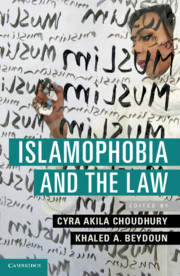Book contents
- Islamophobia and the Law
- Islamophobia and the Law
- Copyright page
- Contents
- Note on Contributors
- Acknowledgments
- Introduction
- Part I Race and Citizenship
- 1 The Citizen and the Terrorist
- 2 Race, Civil Rights, and Immigration Law after September 11, 2001: The Targeting of Arabs and Muslims
- 3 Constructing Good Aliens and Good Citizens: Legitimizing the War on Terror(ism)
- 4 A Rage Shared by Law: Post–September 11 Racial Violence as Crimes of Passion
- Part II The Politics of Islamophobia in the Courts
- Part III Islamophobia in Criminal Law and National Security Law
- Part IV Law, Society, and Islamophobia
- Index
4 - A Rage Shared by Law: Post–September 11 Racial Violence as Crimes of Passion
from Part I - Race and Citizenship
Published online by Cambridge University Press: 29 September 2020
- Islamophobia and the Law
- Islamophobia and the Law
- Copyright page
- Contents
- Note on Contributors
- Acknowledgments
- Introduction
- Part I Race and Citizenship
- 1 The Citizen and the Terrorist
- 2 Race, Civil Rights, and Immigration Law after September 11, 2001: The Targeting of Arabs and Muslims
- 3 Constructing Good Aliens and Good Citizens: Legitimizing the War on Terror(ism)
- 4 A Rage Shared by Law: Post–September 11 Racial Violence as Crimes of Passion
- Part II The Politics of Islamophobia in the Courts
- Part III Islamophobia in Criminal Law and National Security Law
- Part IV Law, Society, and Islamophobia
- Index
Summary
September 11 will long be associated with unthinkable violence. The sheer magnitude of the terrorist attacks, the visual imagery of the collapsing towers of the World Trade Center, and the extensive media attention given to the victims have defined the violence of September 11 in unitary terms. But in the aftermath of the terrorist attacks, another form of violence spread across the country: in the days and weeks after September 11, over 1,000 bias incidents against Arabs, Muslims, and South Asians were reported. These incidents, including the murders of as many as 19 people, assaults on scores of others, vandalism of homes, businesses, and places of worship, and verbal harassment of countless individuals, form part of the subterranean history of September 11. While the violence of September 11 itself is largely thought to have been incomprehensible, post–September 11 hate violence is remarkable precisely because it is something we can understand. Although condemned as individual acts of criminality, the phenomenon of hate violence toward Arabs, Muslims, and South Asians is one that appeared to need little explanation; it was accepted as a regrettable but expected response to the terrorist attacks. As early as September 12, 2001, major newspapers reported predictions of the violence against these communities.
- Type
- Chapter
- Information
- Islamophobia and the Law , pp. 77 - 92Publisher: Cambridge University PressPrint publication year: 2020



